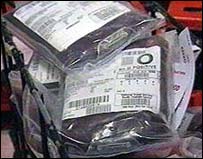So, what exactly does the Blood Service do anyway?
The National Blood Service is a vital part of the NHS. We deliver blood, blood products and tissues from our 15 blood centres for transfusion to patients anywhere in England and North Wales.
We depend entirely on voluntary donations given generously by the general public.
Our processing labs filter donations and split them into components including red cells (often used for operations or major traumas), white cells (often used for leukaemia patients), frozen plasma (often used for serious burns victims) and platelets (used for those who have disorders with clotting).
Our testing labs test every unit to determine which group it belongs to. There are 8 groups: O+ (the most common), O-, A+, A-, B+, B-, AB+ and AB- (the rarest). There are further specialist groups within these, like Sickle Cell negative. Every donation is also rigorously screened for infections so that it is safe for patients. The blood which patients receive is specially matched to their individual medical needs and can make the difference between life and death.
Our staff are highly experienced and trained in the latest transfusion science research available.
Every year we collect, test, process, store and issue 2.1 million blood donations.
Our National Health Service would not be able to function without the National Blood Service.

Labels: About the NBS, FAQ


0 Comments:
Post a Comment
Subscribe to Post Comments [Atom]
<< Home